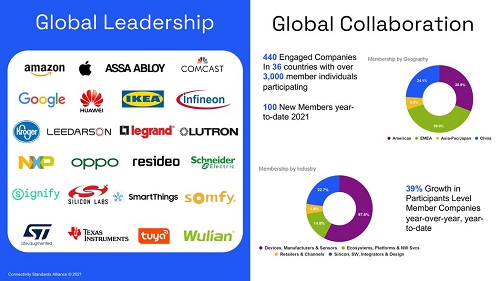2.11.22 – SIW

Inside one of the hottest smart home trends at CES: Device interoperability
This article appears in the CES Show Report in the February 2022 issue of Security Business magazine. When sharing, don’t forget to mention Security Business magazine on LinkedIn and @SecBusinessMag on Twitter.
Device interoperability has long been a hot topic in the security industry, and industry standards from ONVIF to PSIA to OSDP and others are working to address the issue on the commercial side of the industry.
From the point of view of the residential/smart home market, interoperability is still something to strive for, but is lacking in development.
At CES, one of the hot topics was an in-development smart home interoperability protocol called Matter. At the current moment, Matter doesn’t matter; however, that does not mean that residential integrators should ignore it, monitor its progress or even root for its success.
What is Matter?
Matter is a proprietary, royalty-free home automation connectivity standard. First announced on Dec. 18, 2019, Matter aims to reduce fragmentation across different vendors, and achieve interoperability among smart home devices and Internet of things (IoT) platforms from different providers.
The project group was launched and introduced by some of the biggest smart home heavy hitters, including Amazon, Apple, Google, Comcast and the Zigbee Alliance, which has since been renamed the Connectivity Standards Alliance (CSA). Subsequent members include recognizable security companies such as ASSA ABLOY, Resideo, Schneider Electric and others.
Simply by reading the definition, you may think that Matter is a new standard that aims to replace others, like Wi-Fi or Z-Wave, but that is not really the case. Matter is simply an “application layer” that allows for all the different protocols – like Thread or Bluetooth or ZigBee or Z-Wave – to co-exist and communicate with each other. It is essentially a “universal translator” that knows how to tell devices using the various protocols how to talk to each other.
To understand what an “application layer” is, it is going to have to get a little technical. All network architecture is made up of seven “layers” – known as the OSI Model of Networking – which include Physical, Data Link, Network, Transport, Session, Presentation and Application. The layers are usually represented as a “stack,” with Physical at the bottom and Application at the top.
All of the layers must be defined in a protocol – whether that protocol is Wi-Fi, Zigbee or Z-Wave. The “Application” layer is the one that Matter seeks to unify into a shared language. It does not address any of the other layers, thereby leaving them to the concern of the underlying protocol.
When people ask about Matter, they usually ask if it will replace other protocols, and the answer is no. It only seek to unify the ability for various protocols to understand each other, not replace all of the protocols.
Why it is Significant
Why does Matter matter to a residential security integrator? In a word, choice. Since Matter seeks to unify all of the products in the market, this will give the people who install these solutions more choice when it comes to finding the right solution for their customers.
It also means that installations should become easier to accomplish while at the same time being more secure and reliable.
What should an integrator do? The good news is, nothing! The products that integrators are installing today will become the Matter products of tomorrow.
Many of the largest manufacturers have said that their products will become Matter compatible with a simple update. Those that cannot be updated will be connected through a “bridge” device to connect them to other Matter devices.
The timing for all of this is still very much up in the air, which is why Matter doesn’t matter just yet. There are dozens of companies working on the standard, so it will take time for them to all agree on issues like encryption, prioritization, and other factors.
Thus, while Matter doesn’t matter today, it will be really cool if it actually accomplishes what it has set out to do.
Avi Rosenthal is a managing partner for Bluesalve Partners LLC (https://bluesalve.com), a smart home and security consulting firm.
